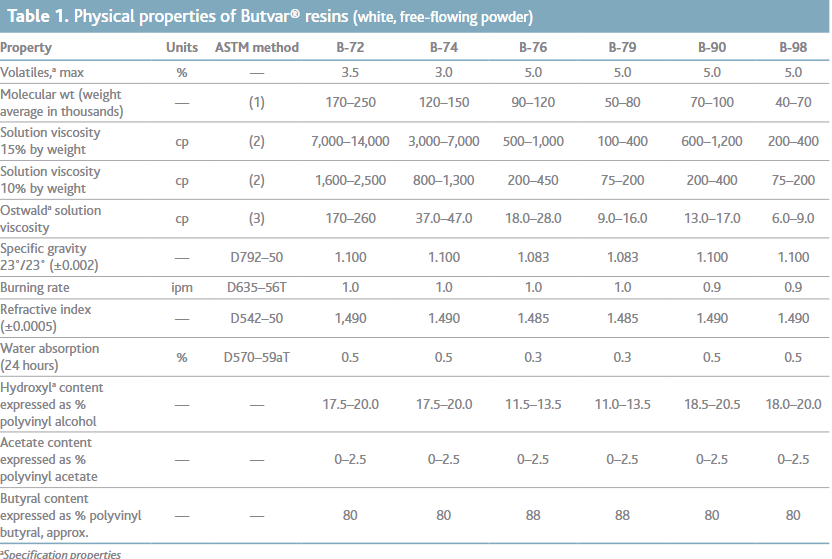Свойства различных видов смол Бутвара приведены в таблицах 1–5. Эти смолы имеют различную молекулярную массу и вязкость. Бутвар 76 и Бутвар 79 Смолы имеют меньшее содержание гидроксилов по сравнению с другими вариантами Бутвара, что обеспечивает им лучшую растворимость.

Обычно, когда вы меняете группы бутираля на группы ацетата, вы получаете полимер, который лучше отталкивает воду и может лучше выдерживать тепло без деформации. Это изменение также повышает прочность полимера и то, насколько хорошо он прилипает к различным поверхностям. Сильная адгезионная способность поливинилбутиральных смол обусловлена их терполимерной структурой. Поскольку каждая молекула имеет выбор из трех различных функциональных групп на своей поверхности, вероятность адгезии к широкому спектру субстратов значительно увеличивается.
Хотя поливинилбутиральные смолы (ПВБ) обычно термопластичны и растворимы в ряде растворителей, их можно сшивать под воздействием тепла и небольших количеств минеральной кислоты. Сшивание часто происходит посредством трансацетализации, но оно может быть вызвано и более сложными процессами, такими как реакции между ацетатными или гидроксильными группами в соседних цепях.
На практике сшивание поливинилбутиралей достигается путем реакции с различными термореактивными смолами, такими как фенольные, эпоксидные, мочевинные, дицианатные и меламиновые смолы. Наличие функциональных гидроксильных групп в смолах Бутвар для этого типа конденсации является важным фактором во многих приложениях. Включение даже небольшого количества смолы Бутвар в термореактивные композиции значительно улучшит прочность, гибкость и адгезию отвержденного покрытия.

Поливинилбутиральные пленки известны своей большой устойчивостью к различным веществам, таким как алифатические углеводороды и различные виды масел, за исключением касторового и гипсового масел. Они переносят сильные основания, но чувствительны к сильным кислотам. Однако при использовании в качестве компонентов отвержденных покрытий их устойчивость к кислотам, растворителям и другим химикатам значительно увеличивается. Бутираль выдерживает температуру до 200°F в течение длительного времени с небольшим изменением цвета.
Веб-сайт: www.elephchem.com
Ватсап: (+)86 13851435272
Электронная почта: admin@elephchem.com